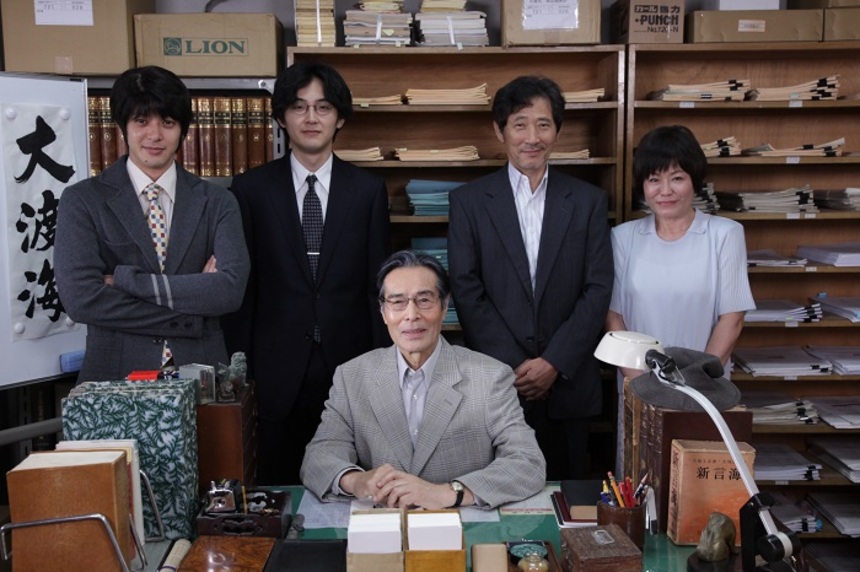17th Japanese Film Festival 2013 Review: THE GREAT PASSAGE Explores More Than The Making Of A Dictionary

Ishii's previous works follow strong but stuck female protagonists caught between the now and the potential future. In The Great Passage Ishii has toned down these inclinations, as every character simply conforms to the idea they will be working on the dictionary until completion. The strong and inherent values of Japanese society are present throughout the film, acting as a display case for them; from honor, respect for elders, hard work and unending support. Unfortunately this is so neatly presented that there is no room for complexity or criticism, although there should be considering some of the impacts these values have on relationships and personal character.
It is 1995 and socially inept Majime (an almost unrecognizable Ryuhei Matsuda) is tasked with helping develop a dictionary. His passionate and stubborn chief commits to the task with his skeleton crew and along the way Majime falls in love with his landlord's daughter Kaguya (Aoi Miyazaki). Twelve years pass and Majime is editor in chief, a new girl comes on-board to help with the dictionary, many challenges are posed, but will hard work and tenacity be enough to get the dictionary finished on time? Just how high have the stakes become for Majime?
This open ended plot actually contains some interesting twists and characters, most of the supporting cast is great. It is just unfortunate that a lot of it is swept under the rug. For instance, the new girl that comes in to help with the dictionary rejects the exercise and thinks everyone is weird, bringing with her potential criticism as a representative of the new generation. At a dinner she refuses to drink beer with them. Jarringly one year later she is completely on board and a later scene even emphasizes the fact that she is willingly drinking beer. It is this layer of conformity that clouds out real character growth in the film, and frustratingly there is no critical emphasis about it. The emphasis is instead on the societal acceptance and a better means to an end, which may be true but the negative repercussions are there; they are just glossed over.
Worse still, twelve years later Majime is in the same place, married to Kaguya who is clearly unhappy but docile and completely supporting of his obsession to finish the living dictionary. Ishii's female characters are so strong so it was very frustrating to see such a shallow unexplored character on the screen.
Ultimately, the wave of conformity washes over proceedings resulting in a very nice film, that uses team dynamics, spirit and tenacious commitment as strong motivators. Embodying these traditional values the film feels pleasant to watch and if you late it take you, can become a tear-jerker in its best moments. The soundtrack is lovely and the period detail of 1995 is well thought out. Do not expect too much with The Great Passage, it is a good film considering the dull premise, but compared to the character driven complexities of his previous films, it is by no means great.
The 17th Japanese Film Festival is now playing in Melbourne Australia from 28th-8th December, check out the schedule here
The Great Passage
Director(s)
- Yûya Ishii
Writer(s)
- Shiwon Miura (based on the novel by)
- Kensaku Watanabe (screenplay)
Cast
- Ryûhei Matsuda
- Aoi Miyazaki
- Joe Odagiri
- Kaoru Kobayashi

Do you feel this content is inappropriate or infringes upon your rights? Click here to report it, or see our DMCA policy.






